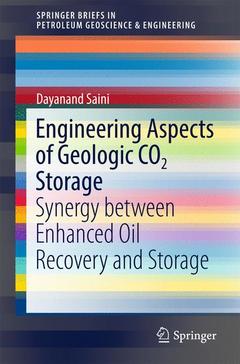Engineering Aspects of Geologic CO2 Storage, 1st ed. 2017 Synergy between Enhanced Oil Recovery and Storage SpringerBriefs in Petroleum Geoscience & Engineering Series

This timely book explores the lessons learned in and potentials of injecting supercritical CO2 into depleted oil and gas reservoirs, in order to maximize both hydrocarbon recovery and the storage capacities of injected CO2.
The author provides a detailed discussion of key engineering parameters of simultaneous CO2 enhanced oil recovery and CO2 storage in depleted hydrocarbon reservoirs. These include candidate site selection, CO2 oil miscibility, maximizing CO2-storage capacity in enhanced oil recovery operations, well configurations, and cap and reservoir rock integrity.
The book will help practicing professionals devise strategies to curb greenhouse gas emissions from the use of fossil fuels for energy production via geologic CO2 storage, while developing CO2 injection as an economically viable and environmentally sensible business model for hydrocarbon exploration and production in a low carbon economy.
Climate Change and the Petroleum Industry.- Relevance of Geologic CO2 Storage to the Petroleum Industry.- Basic Concepts of CO2 Injection-Based Enhanced Oil Recovery Processes.- Selection of Candidate Sites: Recent Advancements in Selection Methodologies.- Review of Successfully Implemented CO2-EOR Projects: Key Features and Challenges.- Simultaneous CO2-EOR and Storage: An Economically Viable and Environmentally Sensible E&P Business Model in a Low Carbon Economy.- CO2-Oil Miscibility: A Key Design Parameter for CO2-EOR Projects.- Recent Technological Advancements for Maximizing CO2 Storage in EOR Operations.- Dedicated Geologic CO2 Storage: Deep Saline Formations.- Past and Current Geologic CO2 Storage Projects.- Monitoring of Injected CO2: Lessons Learned from Tested Monitoring Technologies in the Field.- Geologic CO2 Storage: A Mean to Extract Water from Deep Saline Formations for Beneficial Reuses.
Dr. Dayanand Saini is currently an Assistant Professor of Petroleum Engineering at California State University, Bakersfield (CSUB), where, apart from teaching various core engineering and petroleum engineering electives and developing the petroleum engineering program, as a co-principal investigator for a four-year-long Notational Science Foundation (NSF) funded multimillion dollar research project, he is investigating the feasibility of using CO2 injection as a drive mechanism to produce water formation for beneficial reuses.
Prior to joining CSUB, Dr. Saini worked as Research Manager-Reservoir Engineering at the Energy and Environmental Research Center (EERC) of the University of North Dakota, Grand Forks, ND, where he supervised and managed compositional reservoir simulation, special core analysis (SCAL), and other reservoir engineering related activities for two multimillion-dollar projects. Simultaneously, he worked on CO2 enhanced oil recovery (EOR) and storage demonstration projects funded by the US Department of Energy (DOE)-National Energy Technology Laboratory (NETL). He also conducted CO2 EOR potential evaluation studies of candidate (depleted) oil fields as per client’s needs, and worked as Reservoir Engineer with Oil and Natural Gas Corporation Limited, India, from 2001 to 2006.
Dr. Saini has authored and co-authored several journal articles in the area of geologic CO2 storage (GCS) and has assisted industry clients in making essential business decisions when acquiring depleted oil fields. In November 2015, in recognition of the significant research conducted in the last five years, he was nominated for the €200,000 “Protection of the Environment” Award by the ENI, an Italian multinational oil and gas company headquartered in Rome, in 2016.
Details how regulatory constraints and economic drivers can make dedicated CO2 storage projects financially attractive to industry
Provides a practical approach to making engineering decisions based on the key parameters of geologic CO2 storage
Demonstrates how industrial practitioners can utilize their training to make meaningful contributions in tackling the problem of greenhouse gas emissions via commercial-scale geologic CO2 storage projects
Includes supplementary material: sn.pub/extras
Date de parution : 03-2017
Ouvrage de 73 p.
15.5x23.5 cm
Disponible chez l'éditeur (délai d'approvisionnement : 15 jours).
Prix indicatif 63,29 €
Ajouter au panier